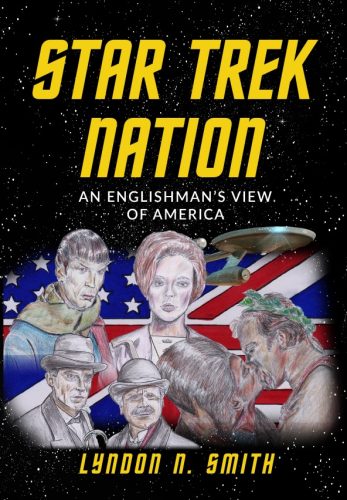 About STAR TREK NATION : An Englishman’s view of America:
About STAR TREK NATION : An Englishman’s view of America:
Professor Lyndon N. Smith’s first book Why You Can’t Catch a Rocket to Mars was a light-hearted foray into the future, which went to #1 bestseller in all the Amazon categories it was listed under and received almost exclusively 5-star reviews. Now, having given us a whirlwind tour of science and technology, in this new book he focuses his attention squarely on the New World. Star Trek Nation: An Englishman’s view of America is a desultory and humorous telling-off of Americans that will be engrossing for you if you experienced, or have interest in, the TV, music, and/or atmosphere of the 1960s and 70s. The model the Professor uses for understanding Yanks is Star Trek and the lens through which he views them is Sherlock Holmes’ magnifying glass. So, if you have any interest in these legends of Anglo-American popular culture, you must read this book to fully appreciate how the reserved folks in the Old Country view the loud dudes one finds stateside, and vice versa. To cut a long story short, the Prof’s conclusion is that we in Olde England love you and we need you! (As I’m sure Ozzy Osbourne once said.) Even so, like most Brits, the Professor is not shy of tackling such important questions as: why do Yanks drive on the right (i.e. wrong) side of the road, what have they got against (hot) tea, and when are they going to get smart (as Trump would say), and adopt The Queen as their head of state? To get the answers, read on…
Buy the book:
Author Bio:
Lyndon N. Smith has a strong interest in science and technology, and a particular fascination with developments in physics and engineering that can have potentially revolutionary effects on the way we live. He feels that scientific and technological developments of recent decades have been less dramatic than was expected, say, seventy years ago and that an investigation into why this is the case and what we can do about it is well overdue. His background includes degrees in physics, robotics and engineering, as well as 26 years of research experience in the UK (and USA), which has resulted in 180 technical papers, two books and the supervision of 20 PhDs. As well as being a professor at a major UK university, he is also something of a bibliophile; but has had a long-standing concern about the lack of accessibility of many science and technology related publications, in terms of the associated difficulties with public engagement with science, as well as reducing the likelihood of science having a strong and beneficial impact on society. He believes that one way to increase the accessibility of science is to employ an informal style, and to make liberal use of quotations and allusions to well-known figures from popular culture. This is what he has aimed to do with his new book. His intention is to make you wonder why we don’t hear more about how modern technologies can revolutionise our lives. He believes we need to spend more time and effort on looking to the future rather than agonising over the past. And he uses discussion of people and events from the past, as well as various predictions of the possible future, to throw light on the situation for science and technology, and what developments we might expect going forward. Lyndon lives in Central Somerset, with his wife and son.